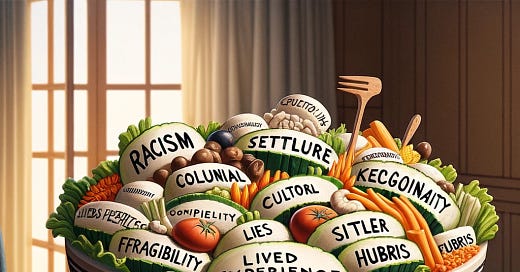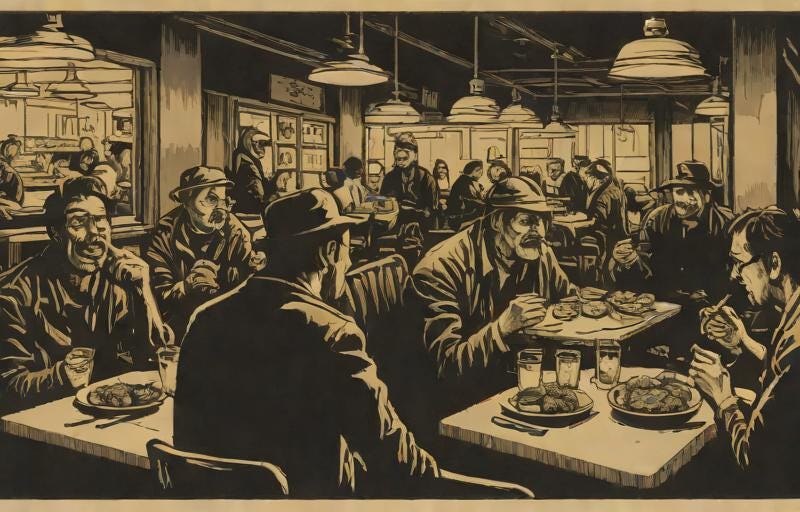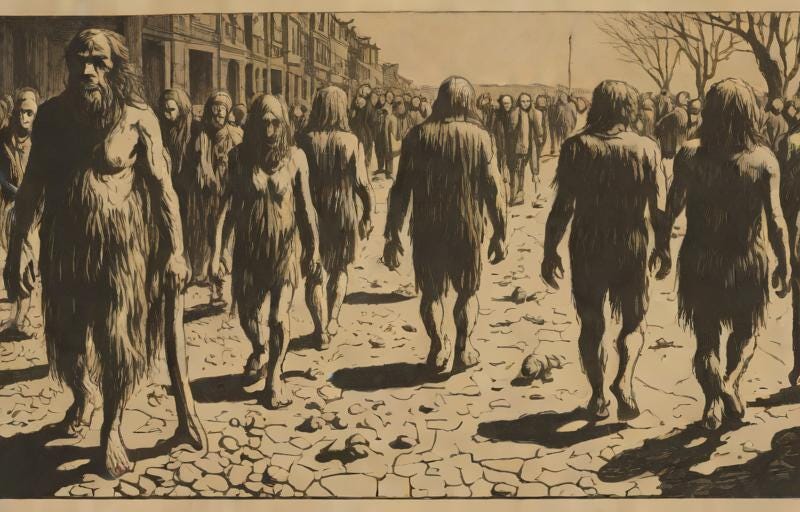PICKING OUT THE PIECES OF A WOKE WORD SALAD
(Note: it would be more like a Greek salad, not a tossed salad. Apologies to Greeks and Greek salad, but the metaphor fell apart with iceberg lettuce)
If you believe in the importance of free speech, subscribe to support uncensored, fearless writing—the more people who pay, the more time I can devote to this. Free speech matters. I am a university professor suspended because of a free speech issue, so I am not speaking from the bleachers. The button below takes you to that story if you like.
Please subscribe and get at least three pieces /essays per week with open comments. It’s $5 per month and less than $USD 4. I know everyone says hey, it’s just a cup of coffee (with me, not per day but just one per month), but if you’re like me, you go, “Hey, I only want so many cups of coffee!” I get it. I don’t subscribe to many here because I can’t afford it.
But I only ask that when you choose your coffee, please choose mine. Cheers.
_______________________________________________
Word salad is a jumble of words loosely tossed in a grammatical bowl that offers the diner little cognitive nutrition. Woke Word Salad (WWS) is a less palatable but perhaps a more attractive variant of the parent food category.
To be a WWS preparer isn’t a compliment; WWS is often a mixture of jargon, buzzwords, and cliches, assembled in the hope that tuned-out listeners will recognize keywords and start jamming the fork in the bowl without really looking at what’s going in their gob.
Still, what strikes me most is not that the word assemblage usually does a wretched job of grounding points in moral principles but the reality that most managers of WWS don’t attempt to be coherent. For them, WWS words are enough, and they believe if they have the right basket of words to toss out when challenged, they are all good; they are now practising intellectuals.
Welcome to the modern University and/or street riot.
These keywords in a modern WWS might include:
Colonial-Settler
Homophobe
Islamophobe
White supremacist
White saviours (those who make best use of the WWS)
Fascist
Far Right (there is no other right)
MAGA
Unsafe (emotionally)
So, week by week, I will pick out and look at the individual pieces of the typical woke word salad. Hopefully, in the end, there isn’t much left.
The words are the verbal equivalent of a prepackaged meal; they pretend to be a complete argument, with analysis and judgment built into one expression. Their presence is designed to end the discussion.
Instead of forcing the user to build up an argument using any spirited rhetorical defence, they toss a few WSWs into the conversation with a religious faith that they are preaching to the converted and that for anyone to challenge them is thus apostasy. Although WSW users tend to be full of intellectual pretence, they are the ones who can’t admit that history and life, in general, never follow their simple, often binary narratives.
The first WWS word combo I’m going after is “colonial/settler.”
The phrase colonial/settler (sometimes reversed) is an accusation, with both the accused and the believer only differentiating based on their respective degree of rhetorical sympathies for the indigenous. Their actions and lifestyle are unaffected.
The accused colonial/settler-type thinker is charged with something similar to a form of long-lived ethnocentrism; evidence against them would be that they don’t want to put land acknowledgements in their email signatures or pompously preface their public expressions with the same. With several small implicit additions, they all say the same:
“We respect that this was originally your land, and respectfully, we do not intend to return it. But we respect you and are willing to buy some prints and dream catchers in the gift store. But they were probably made in China. Sorry. We think this makes it better for you, but we have never asked because we don’t care much; we just want to look cool. ”
Imagine this strange crime: many men break into a food court and eat all the food. While some sit glumly eating and lamenting that this isn’t their food, others eat jubilantly. But they are all eating, and nobody looks like they are about to go home without a full belly.
So, what is the difference between today's ashen-faced, guilty colonial settlers adherents and the ambivalent or the “colonialism brought good and evil, no do-overs?” crowd?
Very little.
And if you don’t allow the indignant to mindlessly buy into the narrative that “if they had been left alone, it would have been wonderful, utopian, Wakanda Forever, and we wouldn’t need to sell hair shirts in the Humanity Department’s bookstore”, they might not get their daily dose of anger/superiority fentanyl.
It's strange how such self-loathing as a personal characteristic can get you committed to the psych ward. But on a country level, it's considered chic and psychologically healthy.
This is why we get groups like LGBT for Gaza. They really can’t see the irony.
But the WWS word’s energy comes from hubris, not reason. It is a tool for the lazy mind that wants to convince itself it has won an argument without crafting an argument. It is accusations and judgements rolled into one, designed to shut down meaningful discussion.
Often, adherents use definitions so broad as to be useless. Is a settler anyone who has come in the last 50 years in Europe? If either of the great wars displaced them, does that give them some exceptional standing? Who are the original occupants of the land? Do the non-settler colonists have to be traced back to the original genetic inhabitants of the land? Is this possible? Men and women have moved, been conquered and conquered land for millennia.
According to a report in the Nature Journal, the modern European gene pool was created when three different groups of people mixed around 7,000 years ago.
First, there were blue-eyed, dark-skinned hunters who mixed with brown-eyed, light-skinned farmers from the Near East as they came to Europe.
There was also another mysterious group with ties to Siberia that contributed to Europe's genetic makeup.
The scientists found this out by studying the DNA of nine ancient Europeans from different periods.
Farming started in the Near East, Syria, Iraq, and Israel and spread into Europe about 7,500 years ago. These farmers mixed with the native European hunter-gatherers they encountered along the way.
However, understanding of European origins was mainly based on the genetics of people alive today. Scientists have tested some of these ideas by studying ancient DNA from old bones and found some surprising results.
In new research, researchers from the Harvard Medical School studied the DNA of seven Scandinavian hunters, one hunter from a cave in Luxembourg, and an early farmer from Germany.
These early hunters had been in Europe long before farming began. In the southern parts of Europe, they survived the Ice Age and expanded as the ice melted and retreated, a period called the Mesolithic.
Their DNA doesn't match that of any modern group of people, suggesting they mixed with the incoming farmers. However, their genetic influence is more prominent in the northeast of Europe than in the south.
On the other hand, the early farmer's DNA closely matches that of people from Sardinia today, but it's pretty different from that of the hunter-gatherers.
Strangely, although these early farmers share some genetic similarities with people from the Near East, they also have some significant differences. Perhaps some recent migrations in the region have diluted their genetic connection.
Did you get all that? I can’t claim to myself.
Research also examined the genes responsible for pigmentation. The early farmers had genes for light skin, while the hunter-gatherers had a unique combination of dark skin and blue eyes, a feature that doesn't exist in modern Europeans.
So, where did the fair skin of present-day Europeans come from? The early farmer was carrying a gene variant for light skin, which is still present today.
The study also found that a third group of people contributed to the genetic makeup of modern Europeans. This group has a surprising connection to Native Americans. Scientists had previously found hints of this group in European DNA, but it remained mysterious until more recent research. This third ancestor mixed with Europeans after farming had already started in Europe.
Can we even determine the land's original occupants and connect them to people living today? Or has intermarriage and travel ended all hope? What does original mean? Does it only start with recorded history?
The history of humanity is strewn with war, prolonged and short, territory gained and lost; it goes into pre-history. I asked a friend with a PhD in history; he said it short and sweetly, “By the early 16th century, the Aztecs had come to rule over up to 500 small states and some 5 to 6 million people, either by conquest or commerce. Tenochtitlán.”
So, history wasn’t all love, harmony and bliss.
We have the Stone Age, Mesolithic, Neolithic, Bronze Age, Copper Age, and Iron Age, or do we ignore the rights of those living in prehistory? Does it only count when they can write?
How many persons can say they have a perfect lineage back to the original occupants of the land where they live today, the land they own today? They may be indigenous, but the land might have been stolen from one tribe several times.
Humans move; they move for food; they move to acquire; it seems somewhat disingenuous to act as if this has never happened.
European and American indigenous tribes had bleeding borders. Still, such is an inconvenient truth, and many fight the truth, pretending that native imperialism didn’t exist and quietly running with an assumption that the indigenous evenly dispersed the land at the start of history and never moved. It’s ahistorical nonsense. Yes, ahistorical is a word, Mr. Spellchecker.
There may have been hundreds of tribes living in North America for thousands of years, hunting and gathering, farming, taking slaves, trading and occasionally participating in cannibalism. The romantic Disneyfied utopia has little connection to reality, as Hobbes famously is said to have deemed medieval England “nasty, brutal and short.” It wasn’t better on this side of the pond.
Hobbes’ consensus was that we had moved from a state of nature filled with perpetual conflict to a social contract, forming a government to foster peace and security. Hobbes was not a romantic, but he seemed to think that centralized government improved society.
Were not indigenous tribes also guilty of settler colonialism? Can we find the oldest bones in every land, genetically analyze them and then proclaim, “All those who have come later are colonists?”
This is a bar we do not set nor prioritize; the entrance and exit of millions of families and the effects of intermarriage are beyond the facilities of even the best AI.
Let’s come back to Canada and talk about our settler-colonialists.
Grandfather homesteaded in Saskatchewan, which makes Grandpa one of those evil settlers. But he never saw an Indian. Settlers are supposed to be the ones who ultimately chased the indigenous away. Colonists make them stay and work as slaves or indentured servants.
The colonialist is the group or the country that comes uninvited to a foreign land and takes over. They establish residence there, push aside the natives, and make it their own. The assumption is that following this, the indigenous are uniformly and consistently worse off. Of course, at times, they are worse off. However, the idea that settlers destroyed a blissful utopia is not accurate. As a kid, I don’t remember Grandpa killing Indians, but I do remember him shooting a coyote that got close to our chickens.
But of course, there is a romanticization of history, a rush to either polarity on assessment, perhaps more driven by a love of feeling morally superior or unwillingness to believe Disney movies are not documentaries.
What would have happened if the colonists hadn’t come?
Then, we get into the unknown world of counterfactuals.
And, of course, there were cruel colonialists. Still, history doesn’t always slide into the narrative du jour so easily. Academics Feyrer and Sacerdote 2009 noted a positive relationship between the number of years spent as a European colony and the current GDP per capita. Similarly, in “The Colonial Origins of Comparative Development: An Empirical Investigation,” Acemoglu, Johnson and Robinson discuss how economic growth outside of Europe was driven by the implantation of good institutions, a result best achieved by settler colonialism with comprehensive population replacement. Such heresy!
And the case is that sometimes these, maybe turn off the dramatic music, these colonials helped build institutions that can be extended to China with Japan and Hong Kong with the British.
Of course, there are many negatives to colonialism, such as the Belgians in the Congo and the development of slavery under colonialism.
As with many sins, we seem to have a selective history of slavery. Looking myopically at the North Atlantic Slave trade, we ignore the fact that slavery goes back to the dawn of history. Unfortunately, it still happens; there are slave nations that give the North Atlantic operations a good run for their money. Barbary Pirates captured 1.2 million Europeans, Arab slave traders are estimated to have captured between 4 and 10 million Africans, and there was significant slave trading among African tribes themselves as well as amongst some North American indigenous tribes.
Bouncing back to colonialism, according to Maddison (a long-established data set from the Northern Netherlands University of Groningen), Thailand's GDP was approximately 13% higher than Myanmar's before colonialism in 1820 and approximately 509% higher today. Similarly, Turkey was 49% richer than Algeria in 1820 but is 154% richer today, even after Algeria’s oil discoveries.
Today, only the preferred idealized Indigenous narrative is acceptable. Worse, those saying that colonial settlers should not be condemned without a trial are told they have an attitude issue, or worse, that they are inhumane.
Of course, the two groups are virtually identical in how they live today.
Who were the original occupants of our land?
In North America, there were seven tribes. There was a constant struggle for survival, constant tribal warfare, no static ownership of land, and perpetual war. When British and French colonists arrived, there were thought to be between 200,000 and 500,000 indigenous people.
We prefer to focus exclusively on the sins of white Europeans, whether or not the facts support this. Slavery is endemic to indigenous cultures, as well as slaves being moved across the oceans, and sadly, this institution has existed for most of history.
What is the great sin? Moving? Should every nation have a clear genetic lineage to the oldest bones in the land? And if they don’t? If the land has been conquered 12 times, why only speak of the 10th or the 11th?
A settler mindset is accused of ignoring past days. But it is more a self-hating Western spirit of selective morality and profoundly anti-intellectual. It dares to toss aside the concepts of reason and science that led us to develop the polio vaccine and put untested traditions on the same level because of some misplaced desire for cultural respect.
Of course, not all ancient cures and traditions are automatically worthless, but neither do they have value because they are ancient. I am happy we do not have nostalgic yearnings for old European surgery mainstays like doctors helping women give birth without washing their hands post-morgue visit or the idea that bloodletting will cure your headache.
Such thinking - where some call progress out as some form of temporal ethnocentrism - is batty. It is a form of self-hatred that leads nowhere. It presents as respect, but it isn’t respect. It is just a desperate clamouring for moral superiority, and right now, a popular way of doing so is bleating on about how settler colonialism mentality has infected our culture. Their wisdom is like cultural DDT.
Very often, the settler colonial narrative cherry-picks from the history tree, using confirmation bias to fill in gaps or omitting details that don’t fit nicely with their political agenda.
History should be about context, truth-telling, and counterfactuals and less about creating more ingredients for a Woke Word Salad.
What is the person who gibbers on about settler colonialism doing about this grievous historical sin?
Are they moving forward with treaty rights? Or are they simply morally preening? If you believe in the importance of free speech, subscribe to support uncensored, fearless writing—the more people who pay, the more time I can devote to this. Free speech matters. I am a university professor suspended because of a free speech issue, so I am not speaking from the bleachers. The button below takes you to that story if you like.
Please subscribe and get at least three pieces /essays per week with open comments. It’s $5 per month and less than $USD 4. I know everyone says hey, it’s just a cup of coffee (with me, not per day but just one per month), but if you’re like me, you go, “Hey, I only want so many cups of coffee!” I get it. I don’t subscribe to many here because I can’t afford it.
But I only ask that when you choose your coffee, please choose mine. Cheers.
_______________________________________________
We should be honest about history and let it be what it was, not what our romantic narratives would suggest. We owe people the truth: land acknowledgement has become fashionable. Perhaps they are meant as a token of respect, but is it respectful to say we live on the unceded territory of this tribe - unceded, meaning that it was never given up or sold by the earliest native occupants - with the following point implicit - we aren’t giving it back?
Are the forces of settler colonialism little more than an attack on European culture and enlightenment values that use indigenous straw men as weapons? Should the indigenous among us be treated with more respect?
Should they be given the agency to increase their prosperity?
Should long-standing treaty delays be remedied and their ancient cultures be treated respectfully? Certainly.
Can indigenous economic growth be tied to modern investment in places like Fort McMurray and the Ring of Fire? Certainly. But does preaching natives' myths or having white people lie about their Indigenous ties and the continual demonizing of our modern society aid in this grand effort?
Or does it simply ensure that a small group of academic agitators, environmentalists who pretend to speak for the Indigenous and all those non-natives who profit from the native industrial complex continue to be well funded, with little progress being made on critical Indigenous needs?















